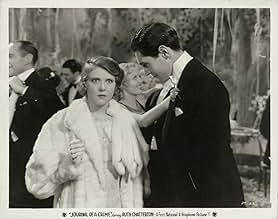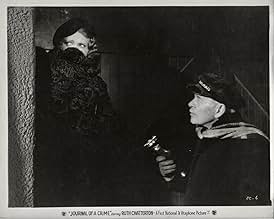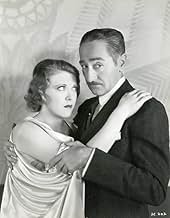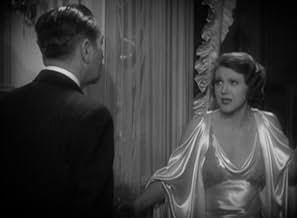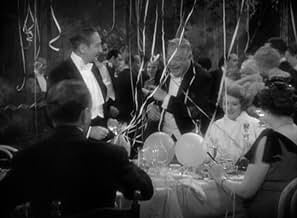Agrega una trama en tu idiomaA wife shoots her husband's mistress. Afterwards, she is tormented by guilt when someone else is blamed for the crime.A wife shoots her husband's mistress. Afterwards, she is tormented by guilt when someone else is blamed for the crime.A wife shoots her husband's mistress. Afterwards, she is tormented by guilt when someone else is blamed for the crime.
- Dirección
- Guionistas
- Elenco
- Germaine Cartier
- (as Douglas Dumbrille)
- Frau Winterstein
- (as Elsa Jansen)
- Paul's Valet
- (sin créditos)
- Chorus Girl
- (sin créditos)
- Man at Play Party
- (sin créditos)
- Dirección
- Guionistas
- Todo el elenco y el equipo
- Producción, taquilla y más en IMDbPro
Opiniones destacadas
Other than for this confusion, I thought the film well acted. Adolphe Menjou is always worth watching - as suave a gentleman as you'll find anywhere. Ruth Chatterton was also admirable, if soft-pedalled most of the time.
Like another commentator, I, too, was pleasantly surprised by the thwarting of the always-annoying Hays Office. I can only guess that Francoise's saving of the child's life near the end was sufficient evidence of goodness to placate the prissy Mr. Hays.
When he comes home Menjou does finally tell Chatterton it's over, but that drives her to a homicidal rage. She does shoot Dodd, but has a stroke of luck in that Noel Madison, a bank robber who had shot and killed a teller during a robbery took refuge in the same theater location and gets arrested. She gets away with it except that Menjou finds evidence to arrest his wife. He hides it, preferring to let Chatterton work it out for herself, one way or another.
The title comes from the fact that Chatterton as a kind of self therapy starts keeping a journal of her conscience. She's not a hardened criminal, just a woman who was done wrong. The film is totally dominated by her performance.
Though Journal Of A Crime is excessively melodramatic, it does give Ruth Chatterton a really good role where her facial expressions like in a silent film contain more than pages of dialog. In the end fate has an interesting ending for her and Menjou for that matter.
- BANG! -
Then the crime takes place, and by amazing coincidence a bank robber just happens to be hanging around backstage to take the fall for the real culprit. The coincidences now start piling on faster and faster, crammed into an incredible 64 minutes whose tortuous twists and turns are probably the result of the writing being on the wall about the new Production Code just months away. The code wasn't in force yet, so both adultery and murder go unpunished; but the narrative that follows twists itself into greater and greater contortions in seeming anticipation of Joseph Breen's coming blue pencil.
Francoise Mollet (Chatterton) gets wind her husband, Paul (Adolph Menjou) is having a serious dalliance with a stage actress that threatens her marriage. When she fails to reverse his course she heads to the theatre and blows the thespian mid rehearsal away. By the oddest coincidence though a bank robber who has just murdered a teller takes refuge at the playhouse is captured and charged with her murder as well. Paul knows better however and decides to let his "fiend" wife stew in her own juices before confessing.
The preposterous scenario is too far fetched to give Journal of a Crime a passing grade but Ms. Chatterton is every bit as effective as she was in the classic Dodsworth living out the same self absorbed, petty existence of delusion and humiliation but with more dire consequence. Menjou displays some interesting restraint as Paul who in his own way and with less explanation does some unorthodox enabling that not only keeps Ruth from being fried but also buys enough time to have another misfortune benefit her. The turn of events that may save Francoise however only builds the case against the incredulous plot that dooms this film.
¿Sabías que…?
- TriviaThe opera shown on the theatrical posters in the opening scenes is "Adelia," by Donizetti.
- ErroresSomeone as "highly intelligent" as Francoise would not have disposed of the murder weapon in a bucket of water, where someone would be sure to find it.
- Citas
Dinner Guest: The way I look at it, Mr. Attorney General, there will be crimes of passion as long as there is passion.
Germaine Cartier: In my opinion, madame, the urge to kill has roots in hatred, rather than in passion or in love. Hatred in it's most severe form. Jealousy. Don't you agree with me?
Francoise Moliet: Well, you may be right, Mr. Attorney General. I don't know, but, a woman - or a man - may have a deeper motive for killing than jealousy or even love. A human being could kill because she herself has first been killed. Before she kills, the other two, the victim and her accomplice, must have killed her soul. Murdered it. A soul that murders in it's turn.
- Créditos curiososOpening credits are shown on the pages of a book, a reference to the "journal" in the title.
- ConexionesRemake of Une vie perdue (1933)
Selecciones populares
Detalles
- Tiempo de ejecución1 hora 5 minutos
- Color
- Mezcla de sonido
- Relación de aspecto
- 1.37 : 1

